Archive for the ‘Visions’ Category
 |
22. May 2012 – 10:09 by Asociacion Ciudades Kyosei / Pedro Prieto-Martin
|
 This week Avaaz, the “campaigning community bringing people-powered politics to decision-makers worldwide’, started the beta-testing of its community petitions platform, which allows anybody to launch a petition in a question of minutes. This new systems empowers anybody to make use of the streamlined processes and tools that have allowed Avaaz to grow its user base to more than 14.400.000.
This week Avaaz, the “campaigning community bringing people-powered politics to decision-makers worldwide’, started the beta-testing of its community petitions platform, which allows anybody to launch a petition in a question of minutes. This new systems empowers anybody to make use of the streamlined processes and tools that have allowed Avaaz to grow its user base to more than 14.400.000.
 Avaaz thus follows the recente move from change.org, the “social action platform that empowers anyone”, which just two weeks ago ‘absorved’ the Spanish platform “Actuable” and is now planning to translate its ‘petition making system’ to many other languages to really extend its reach worldwide.
Avaaz thus follows the recente move from change.org, the “social action platform that empowers anyone”, which just two weeks ago ‘absorved’ the Spanish platform “Actuable” and is now planning to translate its ‘petition making system’ to many other languages to really extend its reach worldwide.

Each of these platforms claims to have promoted petitions that forced very important political ‘actors’ to react: from Hillary Clinton to Presidente Morales, from Bank of America and Apple to Hilton Hotels.
 This is an interesting ‘tectonic’ move in the realm of (e)Participation, which we should follow closely. It is, additionally, much related to the discussion about “Sticks and Carrots” we hold in Pep-Net’s blog a year ago.
This is an interesting ‘tectonic’ move in the realm of (e)Participation, which we should follow closely. It is, additionally, much related to the discussion about “Sticks and Carrots” we hold in Pep-Net’s blog a year ago.
We were then reflecting about questions like: is it better to praise “good deeds” of Corporation and Politicians, or is it better to warn and punish them when they “misbehave”? Why not both things at the same time?
Anita Roddick, the founder of the Body Shop, reported that once an executive of Shell told her: “We don’t fear regulation, we only fear consumer revolt”
Well: it is clear now that consumer and citizens are getting better at revolting and exerting pressure. Change is happening out of anybody’s reach, and (e)Participation is slowly “getting teeth”, which soon will be able to hurt enough as to influence behaviour: if you do not want your brand reputation to get ruined… you better behave!!! And this applies to corporation as much as political actors.
The promise of a ‘Future Goverment’ that becomes FAST (flatter, agile, streamlined and tech-enabled) -which was delivered in the last World Economic Forum- starts to be truth. But, for sure, it is not government who is promoting it. It is NGOs and CSOs. It is citizens.
It is important to note that the technology behind these petition plattforms is very, very simple. The concepts and processes of use are also not sci-fiction. But for sure, this kind of powerful, sustainable and social minded (e)Participation was rarely promoted by our Governments’ Innovation Support Actions. Instead of an impact oriented eParticipation research, put at the service of Civil Society, a Government- and Academia-centred approach was preferred. And thus eParticipation has just advance by little steps.
It is a pitty, because these platforms are now out there, growing. They were created with less (or ‘no’) involvement of eParticipation researchers. And that means that we do not have easy access to the very valuable information about eParticipation that these systems are generating (about pattern and reasons of use, users’ demographics, typologies of action, success rates, etc).
We should reflect about this. We have not so many more opportunities to miss. The field is developing faster and faster. Do we want to be part of it?
Posted in good practice, ICT, inclusion, Tools, Trends, Visions | No Comments »
 |
21. March 2012 – 12:46 by cynthiawagner
|
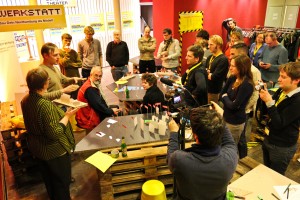 The growth of movements like the Right to the City Movement and protests like Stuttgart21, Gängeviertel, or NO BNQ show the continuously increasing demand for more public participation in urban development. The pilot project Nexthamburg experiments with new ways of public participation in the urban development of Hamburg. The concept of the open and independent crowd-sourcing project will be presented at the PEP-NET Summit on 14th May.
The growth of movements like the Right to the City Movement and protests like Stuttgart21, Gängeviertel, or NO BNQ show the continuously increasing demand for more public participation in urban development. The pilot project Nexthamburg experiments with new ways of public participation in the urban development of Hamburg. The concept of the open and independent crowd-sourcing project will be presented at the PEP-NET Summit on 14th May.
Nexthamburg gathers solutions and challenges for the city of Hamburg in crowd-
sourcing processes. Citizens can post their own solutions for the big challenges on the webpage or other Nexthamburg social media channels, discuss, comment or follow others, create their own vision for Hamburg. They can also participate in one of the Nexthamburg events, for example Nexthamburg Sessions, Salon, Zukunftscafés, or the Zukunftscamp.
The long-term goal of the project is to organize a crowd-funding channel for promising ideas for Hamburg’s urban development to finance feasibility studies and realization efforts.
Nexthamburg is active since April 2009 and has been promoted as a pilot project of national politics of urban development by the federal ministry for traffic, building, and urban development until 2011. It is supposed to become a non-profit association in 2012.
Nexthamburg on nexthamburg.de, facebook, twitter, google, flickr, youtube, issuu
Posted in Events, News, Projects, Visions | No Comments »
 |
14. November 2011 – 23:06 by Asociacion Ciudades Kyosei / Pedro Prieto-Martin
|
The Asociación Ciudades Kyosei is a small civic organization whose aim is to foster Civic Engagement by means of ICT. It was founded in 2006 and is the oldest Spanish NGO devoted to the promotion of (e)Participation. In the last years we were researching on the field of Civic Engagement and ICT, with a special focus on Latin-America and Europe. Our work combines a critical attitude with an applied, hands-on focus, and has (1) theorized about Civic Engagement, (2) analysed the best design practices for (e)Participation systems, as well as (3) analysed the difficulties that exist to promote innovation in the ICT for Governance field. Our research has been widely recognized as refreshing and insightful.
In this PeP-NET post we would like to share a tool we have developed, “The matrix of civic implication”, whose main aim is to support the development of conceptual clarity when analyzing participatory venues and participatory initiatives. If used wisely, we think the matrix is a powerful “tool”, that goes beyond alternative models (like OECD, IAP2 or Fung’s), and should allow researchers, practitioners and the ‘man in the street’ to better understand the core dimensions of participatory activities.
The Matrix of Civic Implication
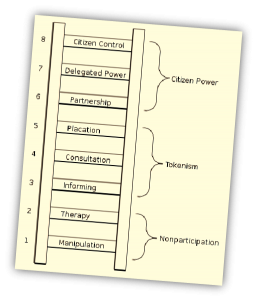 Since Sherry Arnstein presented her “Ladder of Citizen Participation” in 1969, tens of models have been proposed with the aim to describe “participation”.
Since Sherry Arnstein presented her “Ladder of Citizen Participation” in 1969, tens of models have been proposed with the aim to describe “participation”.
The problem with these models is that they tend to be either too basic -and thus they add less value- or they are too complex and specialized, and in this case they are too cumbersome to be applied.
For this reason… a lot of confusion exist in this field.
Our matrix tries to find a pragmatic balance between usefulness and complexity, and provide a tool that is at the same time powerful, practical and easy to use. It allows practitioners and theorists to compare in a matter of minutes different Participatory experiences. The model was developed to be applied to “municipal participation” initiatives, but it can be applied to other kind of participatory experiences.
The Matrix identifies four fundamental dimensions of participatory initiatives, which be informally “visualized”, and thus make this model especially suitable for comparing initiatives:
Read the rest of this entry »
Posted in open data, Tools, Visions | 1 Comment »
 |
28. July 2011 – 16:49 by Asociacion Ciudades Kyosei / Pedro Prieto-Martin
|
“The e-(R)evolution will not be funded. An interdisciplinary and critical analysis of the developments and troubles of EU-funded eParticipation” is the title of a paper that our association recently wrote as part of our research and knowledge dissemination efforts. The article is meant to be properly published soon, but some bureaucratic issues have delayed its release more than we can wait.
Because this paper needs to be read and, more important, discussed while its analyses are still current.
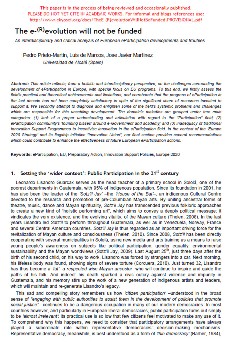 Thus, we have decided to make it provisionally available through PeP-NET. To start such a conversation, what better place than PeP-NET, the Pan European eParticipation network?
Thus, we have decided to make it provisionally available through PeP-NET. To start such a conversation, what better place than PeP-NET, the Pan European eParticipation network? 
We have spent many hundreds of hours researching and writing the paper, as we struggled to make sense of the developments and “under-developments” of eParticipation in the last ten years.
Our appraisal is based on an extensive and interdisciplinary analysis of distinct relevant sources, which included the most recent reports, articles and literature reviews dealing with eParticipation research, practice and theory, as well as projects’ deliverables and evaluations, related databases, and our direct examination of eParticipation systems.
We had to resort to a very varied bunch of disciplines (from history and medicine to Mayan performing arts; seriously!!  ) to be able to achieve a comprehensive understanding of the field’s challenges… and to make a compelling exposition of them.
) to be able to achieve a comprehensive understanding of the field’s challenges… and to make a compelling exposition of them.
The paper ended up being “quite controversial”, as our assessment of eParticipation came to suggest that some of the problems that have hampered its progress have a systemic, overarching character: that kind of ‘elephant in the living room’-issues whose very existence tends to be denied because of their complexity or the embarrassment they cause and, as a result, cannot normally be acknowledged or discussed, let alone get properly sorted out.
Examples of the “embarrassing questions” the paper poses are:
- How can it be that after 10 years… all relevant ‘agendas’ of eParticipation research are still reported as underdeveloped?
- And how can it be that even the most basic questions –for example: the relation of Participation and eParticipation, or the understanding of the dual nature of eParticipaton as something that can be driven by authorities or by citizens themselves– remain unsolved?
- More than 187 millions of Euros were invested in the last ten years to promote experimentation in the field, so… where are the results? Where are the breakthroughs and the research milestones? Can we feel satisfied with just some “vague confirmations” of ideas that 10 years ago could already have been easily guessed?
Through the paper, we have done our best to constructively diagnose eParticipation and to propose some treatments for the field’s maladies. But our perspective and understanding are necessarily limited: the real “treatment” for those problems would require a reflection process that involves the whole eParticipation community.
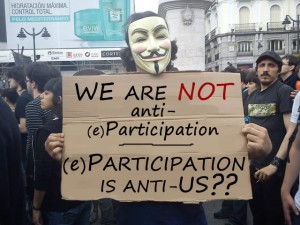 We see this paper as an urgent “call for self-reflection” and consider it a “MUST READ” for anyone involved in European eParticipation: from the officials working at EC’s Directorate for Information society and Media, to the researchers, practitioners, NGOs, public workers, citizen associations… and even any interested European citizen.
We see this paper as an urgent “call for self-reflection” and consider it a “MUST READ” for anyone involved in European eParticipation: from the officials working at EC’s Directorate for Information society and Media, to the researchers, practitioners, NGOs, public workers, citizen associations… and even any interested European citizen.
Therefore, we would like to encourage all our PeP-NET friends and in general all people with interest in eParticipation… to have a look at the paper during this nice summer weekend. 
Anyone who feels “touched” by any of the paper’s claims and argumentations… should speak up and comment to this post. It doesn’t matter if it is to support, extend or complement our asseverations, or to oppose, challenge or further qualify them… please, share your views.
PeP-NET was meant to be a HUB for the conversations around eParticipation. So… let’s discuss. It is important that the issues we showed –be them real or imagined– are talked about, and possibly acted upon.
The environment where we operate is moving. Moving faster and faster. And in the context of the ‘Europe 2020 Strategy’ and its flagship initiative “Innovation Union”, which aims to renew EU’s “Research and Innovation Funding Programmes”, the most important question we need to answer is: “What do we do now??”
For sure, we could keep pretending that there is NO elephant in the living room. Stay in our “academic” Ivory Tower, and just continue doing as we did so far… while we wait for the “barbarians of eParticipation” to arrive, change the democratic landscape by really integrating ICT in governance… and make fools of all us. PeP-NET subscribers included. 
But in our association we want to believe that we, the European eParticipation Community, could do much better than that.
So… no more to say!! Thank you very much for your attention. We hope some of you enjoy reading of our paper and some exchange of ideas can happen afterwards.
—– ADDITION: A CONCEPTUAL MAP SUMMARISING PAPER’S KEY FINDINGS —–
Several people asked for a “summary” version of the paper. Here you have a JPG image (2,5 Mbytes) displaying a Conceptual Map that summarises the paper’s key findings.
I recommend you to save the file first, and then open it with an image editor (like Office Picture Manager) to watch it. It’ll be more easy for you to zoom in and out in the different parts of the image.
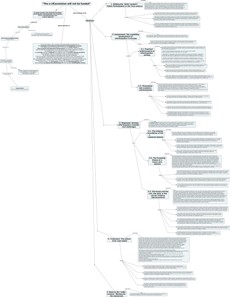
Posted in ICT, Projects, Tools, Trends, Visions | 24 Comments »
 |
9. June 2011 – 12:11 by Asociacion Ciudades Kyosei / Pedro Prieto-Martin
|
News from the Asociación and our main project (english version at the bottom  ).
).
—
Como resultado del nuevo escenario creado en España por movimiento cívico “15M”, que ha inundado las plazas de las principales ciudades españolas (y algunas del extranjero) con sus demandas de una “Democracia Real YA”, en la Asociación Ciudades Kyosei hemos decidido “ponernos las pilas”, para producir cuanto antes una versión alpha del sistema “Kyopol” (aka. “Ciudad Simbiótica”), que podamos poner al servicio de todos los procesos de activación cívica y movilización social que deberían ahora darse, barrio a barrio, en todas las ciudades de España.
Ello nos ha demandado un un cambio de actitud: se hace necesario establecer un equipo más amplio, repartir responsabilidades… y así crear algo útil cuanto antes.
Pues bien, tras un par de reuniones muy productivas ayer martes y el pasado domingo… ¡¡el proceso de creación del Sistema Kyopol se considera “oficialmente iniciado”!!
El Sistema Kyopol (aka. “Ciudad Simbiótica”) fomentará la Implicación Cívica y la “Activación Ciudadana” en los ámbitos municipal y regional. Permitirá a los ciudadanos informarse, formarse y colaborar unos con otros en la mejora de su entorno vital, trabajando en aquellas temáticas que cada uno considere importantes.
No sólo eso: buscaremos que usando el Sistema Kyopol… ¡¡podamos pasarlo “de miedo”!! Que sea una experiencia tremendamente placentera, incluso divertida, eso de unirte a otras personas para implicarte en el “cuidado de lo publico”.
Para la Asociación Ciudades Kyosei… ¡¡haber logrado alcanzar este hito es algo sensacional!! Queremos agradeceros a todos los simpatizantes de la asociación el apoyo que nos habéis brindado hasta ahora y advertiros… ¡¡que ahora es cuando empieza el trabajo de verdad!!
Nuestro trabajo se desarrollará a partir de ahora mediante la estrecha colaboración de dos equipos:
- Primeramente, el “Grupo impulsor” -compuesto por informáticos, investigadores y personas vinculadas con la participación- construirá prototipos del sistema y establecerá las metodologías, los recursos participativos y los arreglos institucionales que formarán parte del sistema.
- En segundo lugar, el “Colectivo de pioneros”, integrado por representantes de todos los colectivos que usarán el sistema (desde ciudadanos y asociaciones de vecinos a políticos y técnicos municipales, pasando por medios de comunicación, ONGs, sindicatos y partidos políticos y, por supuesto, ahora también movimientos sociales del estilo 15M, DRY y demás bichos que éstos engendrarán en los próximos meses), que nos ayudarán probando los sucesivos prototipos del sistema, y proporcionandonos feedback en relación a las funcionalidades y procedimientos que propongamos.

En base a ello, podremos disponer de una versión Beta del sistema, lo suficientemente madura para iniciar proyectos piloto. Primeramente en el entorno de Madrid -que es de donde provienen la mayoría de nuestros Pioneros”-, y posteriormente en todas las regiones de España, y finalmente en el ámbito Latino-Americano y Europeo.
Si tenéis interés en formar parte del “Colectivo de Pioneros”, por favor contáctanos cuanto antes.
Planeamos realizar un acto de presentación del proyecto a todos sus potenciales interesados, en las instalaciones de la Universidad de Alcalá. ¡¡Os invitamos a tod@s a que nos acompañéis en el evento!!
Os mantendremos informados (podéis seguirnos en la web de la asociación, facebook o twitter).
—–
Urged, and inspired, by the emergence of the #SpanishRevolution, which has crowded the main squares of many spanish cities (and several foreign ones too!) to demand a “Real Democracy NOW!”… we have tried to accelerate our association’s projects.
And… after a couple of very productive meetings on Tuesday and on last Sunday … the construction of the “Kyopol System” has been “officially started”!
Kyopol (aka. “Symbiotic City”) will promote “citizen activation” and civic involvement in the municipal and regional levels. It will allow citizens to inform themselves about civic issues, “educate” themselves on how to “participate”, and collaborate with each other to improve their shared living environment, by collaboratively working on those issues that each one considers important.
Actually, our aim is that by using Kyopol we citizens will be able to experience a great deal of fun (and proudness!). Isn’t that the way that “meeting fellow citizens to jointly care and work for the common good” should taste?!
For the Asociación Ciudades Kyosei… having reached this milestone is something sensational! We want to thank all supporters of the association for the help we have received so far, but also warn them… that the real work is about to start!!
Our work will be developed through the collaboration of two teams:
- First, the “Core Team”, which is mainly composed of developers and citizen participation’s researchers, practitioners and stake-holders, who will work together to construct prototypes and establish the participatory methodologie,s the formative resources and the institutional arrangements that will surround Kyopol.
- Second, a “Pioneers Team”, that integrates representatives of all groups that will use the system (citizens, neighbourhood associations, governments oficials, politicians, NGOs, media, social movements, etc…). They will act as “Alpha testers”, and will help us testing our prototypes and providing feedback in relation to the functionalities and the participatory methodologies and resources we propose.

Based on this work, we will construct a Beta version of the system, mature enough to initiate pilot projects. These will first first in the surroundings of Madrid, where most of our Pioneers are located, and will afterwards get extended to several regions in Spain, and finally to the wide Latin American (and European) environments.
The next milestone we are planning is a meeting at the University of Alcalá, where the project will be presented to all potential stakeholders. Collaborative work will start immediately afterwards.
We’ll keep you informed (and you can follow us on our website, facebook or twitter).
Posted in ICT, members, Projects, Tools, Visions | No Comments »
 |
17. May 2011 – 10:30 by openaid
|
Can e-participation help to reduce poverty in Africa? Is it a suitable tool to improve the effectiveness of aid projects and to reduce corruption in the aid business? These questions may surprise you, as PEPNET is a network of organisations and individuals working in Europe and even in Europe it is challenging to design well-functioning e-participation processes. OpenAid has been a member of PepNet for a few months and I would like to make our long-overdue self-introduction by describing our vision of e-participation in development cooperation.
OpenAid is a small association based in Germany and our background is evaluation of development projects. Traditionally, funding organisations, like the German ministry for economic development and cooperation (BMZ) commissions experts to visit projects, e.g. in Africa and assess these projects based on predefined criteria. While this type of project evaluation a very dominant feature of the development business, it has only limited value. In an evaluation, for example of a water project in Southern Cameroon, only the questions that are most interesting to the donors in Germany and to the project managers get asked. Concerns that people living in the project areas may have will not be addressed, if the project management is not aware of them or does not want to address them.
In addition, most citizens in a project area are not able to talk to the evaluators, due to the tight time schedule of evaluations, distances in the project area and language barriers. Providing feedback about a project on a regular basis is close to impossible.
We at OpenAid are convinced, that this lack of feedback in aid projects is a big problem, and we think that advances in technology and social media can help to fix the feedback loop. This is where we why we are interested in experiences about e-participation in Europe. What are the lessons learnt in Western Countries about the conditions for successful e-participation? And which of these lessons are applicable to development cooperation?
We call our e-participation project public online monitoring of development aid. In our thinking there are several elements to public online monitoring:
1) General information about aid projects: The more information and the more open the information, the better. This strand of our work links us to the open data movement. International development cooperation has been very slow to provide information in accessible format to a wider public. But currently the aid transparency debate and open data initiatives in development cooperation are gaining momentum. OpenAid has been promoting aid transparency, and particularly the International Aid Transparency Initiative (IATI) since 2009. We are currently organising a major open aid data event in Berlin for September 2011.
2) Mobile Technology and Connectivity: Costs for providing and distributing information to a large audience have plummeted due to the advances of technology in recent years. Of course, in many rural areas of Africa, Asia and Latin America, good internet connections are not self-evident. But mobile services can substitute regular internet connections to a certain degree. This is why we are very interested in the creative use of SMS and other mobile applications. For the time being it is also possible to experiment with public online monitoring in urban areas e.g. in Africa that have good internet access. We are convinced that access to the internet in rural areas will continue spread in the coming years.
3) Online communities: Where should people go to provide feedback about a water project, about a health clinic or about a school feeding programme? Where is the virtual comments box for aid projects? One option would be for large aid projects to set up their own online community. But it will probably be difficult to generate enough among citizens living in the project area and other concerned people to bring such a community to life. This is why we propose to use existing social networks, where people already connect, to monitor projects that interest them. Traditionally these social networks were community meetings e.g. in churches and mosques. Today, social media networks can complement offline communities. So, we have in mind to “project groups” on social media networks like Facebook. On the one hand Facebook has a fast growing number of users in e.g. development countries. On the other hand, however, the criticism about Facebook is increasing and other social media networks may be more appropriate.
In our advocacy work on aid transparency we have seen, that migrants from Africa, Asia and Latin America tend to have a strong distrust of the aid system and strong feelings about misuse of funds in development cooperation. Therefore we are currently exploring possibilities to cooperate with migrant communities in Germany to build online communities around individual projects or around development cooperation going to geographically limited areas.
Other possible drivers of online communities are donors themselves. The example of AKVO in the Netherlands demonstrates, that even governmental aid agencies are recognising the value of collecting public feedback on projects via the internet. We are hoping that other donors will follow the same path.
4) Choice of projects: Finally, we are convinced that not all aid projects are amenable to public online monitoring. Projects targeted at young, urban, educated people are probably more suitable then projects targeted at elderly, rural, illiterate citizens. Projects delivering direct services like health programmes or water projects will probably attract more interest then projects focused on administrative reforms in ministries or projects targeted small minorities in the population.
Until now, OpenAid has been active on the precondition of public online monitoring: access to open data on aid activities. We are just taking the first steps to make public online monitoring a reality. We hope that successes and failures of e-participation in Europe will help us make good choices in this process and hope to be able to share our experiences with member of PEPNET in the future. If you have any comments on our concept so far or if your organisation is interested in collaborating on this project, please contact me under claudia.schwegmann@openaid.de!
Posted in members, open data, Projects, Visions | No Comments »
 |
17. December 2010 – 17:25 by John Heaven (TuTech Innovation GmbH)
|
You’ve joined us for live chats on the blog, taken part in our online discourses, chatted to us at conferences, read PEP-NET members’ articles, and downloaded the free PEP-NET Issue of JEDEM. Eighty-six of you even came to Hamburg to join us for the PEP-NET Summit. Before the year is out, we would like to ask you take part in one final activity: our survey “Looking Forward, Looking Back: eParticipation Trends in 2010 and 2011.”
So what were the main trends in 2010? What areas of eParticipation made particular progress, and what events defined the eParticipation calendar? And while you are thinking about trends, what do you think will be up and coming in 2011? Nobody can predict the future, but it will be interesting to find out how 2010 was for friends of PEP-NET, and what they expect in 2011.
When I’m back in the New Year, I’ll put together a summary of results. I think it will make for interesting reading – but only if you take part, that is!
In the meantime, from Edinburgh to Athens, Madrid to Minsk: wherever you are, Merry Christmas and a Happy New Year!
Posted in members, Trends, Visions | No Comments »
 |
18. November 2010 – 10:32 by John Heaven (TuTech Innovation GmbH)
|

Manuel Kripp, MD of E-Voting.cc
Manuel Kripp, Managing Director of PEP-NET member E-Voting.cc, recently visited the US during the mid-term elections, so I was very curious to find out what he had got up to. We spoke about electronic voting machines, the role of social media in the US elections, and the need for change management when introducing E-Voting technology.
To find out what E-Voting.cc does, see their website or my previous interview with Manuel’s predecessor Robert Krimmer.
John Heaven: Hi Manuel. I hear you’ve been travelling recently. What were you up to?
Manuel Kripp: I was invited to participate in the 2010 U.S. election program organised by the International Foundation for Electoral Systems (IFES), and by the the Electoral Assistance Commission (EAC) to observe the election on Tuesday 2nd November.
The conference was well attended by experts from around the world, including Thomas Wilkie (Chief Executive, IFAS), Doug Chapin (Pew Centre on the States), and Bob Carey (Federal Voting Assistance Program). The Jo C. Baxter prize was presented to Dr Kwadwo Afari-Gyan, Chairman of Ghana’s Electoral Commission, for invaluable contributions to democracy in Ghana.
The focus of my visit was on seeing how elections are conducted in other countries from around the world, and comparing the US electoral system with how things are done in Europe.
Read the rest of this entry »
Posted in Interview, members, News, Trends, Visions | No Comments »
 |
16. November 2010 – 17:49 by Institute for Electronic Participation
|
 This year largest eDemocracy conference in South East Europe took place during 12-14th September, 2010 in Ohrid, Macedonia.
This year largest eDemocracy conference in South East Europe took place during 12-14th September, 2010 in Ohrid, Macedonia.
The e-Democracy Conference 2010 welcomed 30 delegations from 15 countries. 100 participants from Parliaments, Governments and Official Journals, as well as representatives from international organizations, business sector and academia were engaged in fruitful and interesting discussions about the role that ICT can play into improving the democracy and transparency of the public institutions. More information about the conference is available at https://www.edemocracy.mk.
The e-Democracy Conference 2010 topics included:
- Future and emerging technologies for e-Democracy
- Compliance and standards (EU perspective)
- How to support “Green IT” initiative in the policy development
- ICT in legislative knowledge management
- How can information technology transform the way parliaments and governments work
- Interoperability in the legislative process
- Parliaments and Democracy in the Twenty-first century
- State of ICT development in Parliaments
- ICT in parliaments current practices
- e-Parliaments-The Use of ICT to Improve Parliamentary Processes
The participants at the e-Democracy Conference 2010 agreed that the progress that Macedonia has made in using ICT for improving democracy is an example that all the countries in the region should follow.
Read the rest of this entry »
Posted in Events, good practice, inclusion, members, News, Tools, Trends, Visions | No Comments »
 |
16. November 2010 – 12:00 by John Heaven (TuTech Innovation GmbH)
|

Birmingham's Virtual Library. Click for larger image
It’s easy to reject Second Life as an eParticipation platform, but Birmingham City Council is just about to launch a virtual model of the planned £193m Library of Birmingham. I spoke to representatives of the Council and the company that they are working with to find out what they are doing, and how they are making the virtual library accessible to a wide audience. What I found was fascinating, and I really think Second Life deserves a second look.
Second Life is a virtual world that allows users to assume a second identity and explore a digital three-dimensional world. It’s not difficult to see how this could be used to enable people to “go” to places they wouldn’t otherwise visit, network with people from far away, or take part in virtual events. That’s the theory; but my big issue with Second Life is that it is a very niche audience and it takes quite a lot of effort to download the software and work out how to use it. Once you’re in there, it’s great to be able to look at these virtual buildings and access information; but I can view videos, read text, and chat to friends much more easily using the internet outside Second Life. So why would a city council be interested in Second Life? Read the rest of this entry »
Posted in good practice, Interview, News, Projects, Tools, Trends, Visions | 4 Comments »
 This week Avaaz, the “campaigning community bringing people-powered politics to decision-makers worldwide’, started the beta-testing of its community petitions platform, which allows anybody to launch a petition in a question of minutes. This new systems empowers anybody to make use of the streamlined processes and tools that have allowed Avaaz to grow its user base to more than 14.400.000.
This week Avaaz, the “campaigning community bringing people-powered politics to decision-makers worldwide’, started the beta-testing of its community petitions platform, which allows anybody to launch a petition in a question of minutes. This new systems empowers anybody to make use of the streamlined processes and tools that have allowed Avaaz to grow its user base to more than 14.400.000. Avaaz thus follows the recente move from change.org, the “social action platform that empowers anyone”, which just two weeks ago ‘absorved’ the Spanish platform “Actuable” and is now planning to translate its ‘petition making system’ to many other languages to really extend its reach worldwide.
Avaaz thus follows the recente move from change.org, the “social action platform that empowers anyone”, which just two weeks ago ‘absorved’ the Spanish platform “Actuable” and is now planning to translate its ‘petition making system’ to many other languages to really extend its reach worldwide. This is an interesting ‘tectonic’ move in the realm of (e)Participation, which we should follow closely. It is, additionally, much related to the discussion about “Sticks and Carrots” we hold in Pep-Net’s blog a year ago.
This is an interesting ‘tectonic’ move in the realm of (e)Participation, which we should follow closely. It is, additionally, much related to the discussion about “Sticks and Carrots” we hold in Pep-Net’s blog a year ago.

 The growth of movements like the Right to the City Movement and protests like Stuttgart21, Gängeviertel, or NO BNQ show the continuously increasing demand for more public participation in urban development. The pilot project
The growth of movements like the Right to the City Movement and protests like Stuttgart21, Gängeviertel, or NO BNQ show the continuously increasing demand for more public participation in urban development. The pilot project 












